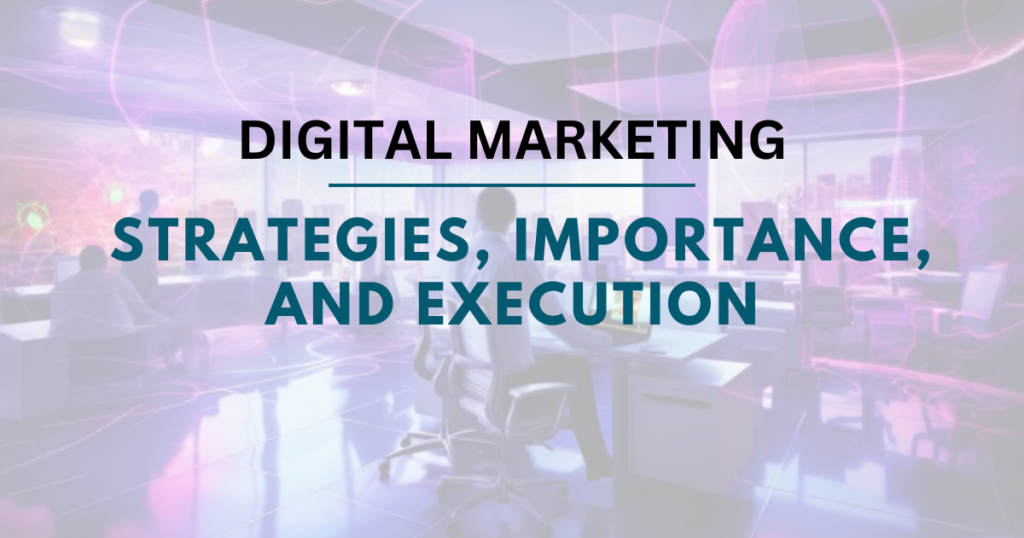Digital Marketing has emerged as the cornerstone of success for businesses worldwide. From startups to multinational corporations, leveraging effective digital marketing strategies is imperative for staying competitive and reaching target audiences.
Understanding the Dynamics of Digital Marketing
Digital Marketing encompasses a broad spectrum of online tactics aimed at promoting products or services, engaging with customers, and driving business growth. From search engine optimization (SEO) to social media marketing, email campaigns, and content marketing, businesses have a plethora of strategies at their disposal.
In essence, Digital Marketing revolves around creating compelling digital experiences that resonate with target audiences, driving them to take desired actions, whether it’s making a purchase, subscribing to a newsletter, or filling out a contact form.
Crafting Effective Digital Marketing Strategies
Crafting effective Digital Marketing Strategies requires a deep understanding of target demographics, market trends, and competitors. Here are some key strategies to consider:
Search Engine Optimization (SEO)
Enhancing your website’s visibility on search engine results pages (SERPs) through SEO techniques such as keyword optimization, content creation, and link building is crucial for driving organic traffic and improving search rankings.
Key SEO tactics include:
- Keyword Optimization: Researching and strategically incorporating relevant keywords into your website content, meta tags, and headings to improve visibility for target search queries.
- Content Creation: Producing high-quality, informative content that satisfies user intent and aligns with search algorithms’ preferences for valuable, authoritative information.
- Link Building: Earning backlinks from reputable websites to signal to search engines that your content is credible and worthy of ranking higher in search results.
Social Media Marketing (SMM)
Engaging with audiences on social media platforms like Facebook, Instagram, Twitter, and LinkedIn enables businesses to build brand awareness, foster customer relationships, and drive website traffic through targeted ad campaigns and engaging content.
Here’s how you can leverage SMM effectively:
- Targeted Advertising: Utilizing social media advertising features to reach specific demographics, interests, and behaviors, maximizing the impact of your ad spend.
- Content Curation: Sharing engaging, visually appealing content that resonates with your audience’s interests, sparking conversations and fostering community engagement.
- Customer Interaction: Actively engaging with followers through comments, direct messages, and polls, humanizing your brand and building trust and loyalty among your audience.
Content Marketing
Creating high-quality, relevant content that educates, entertains, or inspires your audience is fundamental to Content Marketing success. From blog posts and articles to videos, infographics, and podcasts, compelling content helps businesses connect with their target market and establish thought leadership in their industry.
Here’s how you can excel in content marketing:
- Content Diversification: Experimenting with various content formats, such as blog posts, videos, infographics, and podcasts, to cater to different audience preferences and consumption habits.
- Storytelling: Telling authentic, compelling stories that resonate with your audience’s emotions, values, and aspirations, fostering deeper connections and brand loyalty.
- SEO Integration: Aligning your content marketing efforts with SEO best practices to enhance discoverability and organic visibility, maximizing the impact of your content across digital channels.
Email Marketing
Utilizing email campaigns to nurture leads, promote products or services, and build customer loyalty is a cornerstone of Email Marketing. Personalized, well-crafted emails tailored to the recipient’s interests and preferences can yield impressive results in terms of engagement and conversions.
The Importance of Digital Marketing in Today’s Business Landscape
Driving Business Growth
In an increasingly digitalized world, businesses that embrace digital marketing gain a competitive edge by:
- Expanding Market Reach: Breaking down geographical barriers and reaching global audiences through digital channels, driving brand awareness and market penetration.
- Optimizing Cost Efficiency: Achieving higher ROI and lower CPA compared to traditional marketing channels, allowing businesses to allocate resources more effectively and achieve tangible results.
- Harnessing Data Insights: Leveraging data analytics to gain valuable insights into consumer behavior, preferences, and trends, enabling data-driven decision-making and continuous optimization.
Personalization and Targeting
One of the key advantages of digital marketing is its ability to deliver personalized, targeted experiences to individual consumers. By segmenting audiences based on demographics, interests, and behaviors, businesses can:
- Increase Relevance: Delivering tailored content, offers, and recommendations that resonate with each audience segment, enhancing engagement and conversion rates.
- Build Customer Relationships: Establishing meaningful connections with customers through personalized interactions, fostering loyalty, advocacy, and lifetime customer value.
- Drive Conversions: Guiding consumers through personalized conversion funnels, addressing their specific needs and pain points at each stage of the buyer’s journey, and facilitating seamless transactions.
Executing a Successful Digital Marketing Campaign
Executing a successful Digital Marketing campaign requires careful planning, execution, and optimization. Here’s a step-by-step guide to help you navigate the process:
- Define Your Goals: Clearly outline your objectives, whether it’s increasing brand awareness, generating leads, or driving sales.
- Know Your Audience: Conduct market research to identify your target audience’s demographics, preferences, and pain points.
- Choose the Right Channels: Select the digital marketing channels that align with your goals and resonate with your target audience.
- Create Compelling Content: Develop engaging content that speaks to your audience’s needs and interests, leveraging various formats and platforms.
- Implement Tracking and Analytics: Set up tracking mechanisms to monitor campaign performance and gather insights for optimization.
- Optimize and Iterate: Continuously analyze data, test different strategies, and refine your approach based on performance metrics.
Conclusion
Digital Marketing are pivotal for businesses seeking to thrive in today’s digital landscape. By leveraging effective digital marketing strategies, businesses can enhance their online presence, engage with their target audience, and achieve their business objectives. Embrace the power of digital marketing and unlock endless opportunities for growth and success.
FAQ
Q: What are the primary objectives of Digital Marketing?
A: The primary objectives of Digital Marketing include increasing brand awareness, driving website traffic, generating leads, and boosting sales and revenue.
Q: How does SEO contribute to Digital Marketing success?
A: SEO enhances a website’s visibility on search engines, driving organic traffic and improving search rankings, thus increasing brand visibility and attracting potential customers.
Q: Why is content marketing important in Digital Marketing?
A: Content marketing plays a crucial role in Digital Marketing by helping businesses attract, engage, and retain customers through valuable and relevant content that educates, entertains, or inspires.
Q: What role does social media marketing play in Digital Marketing?
A: Social media marketing enables businesses to connect with their target audience, build brand awareness, foster customer relationships, and drive website traffic through engaging content and targeted ad campaigns.
Q: How can businesses measure the success of their Digital Marketing campaigns?
A: Businesses can measure the success of their Digital Marketing campaigns through key performance indicators (KPIs) such as website traffic, conversion rates, lead generation, customer engagement, and return on investment (ROI).
Q: What are some common challenges in executing Digital Marketing campaigns?
A: Common challenges in executing Digital Marketing campaigns include limited budgets, fierce competition, changing algorithms, evolving consumer behaviors, and the need for continuous optimization and adaptation.





Your blog is a constant source of inspiration for me. Your passion for your subject matter is palpable, and it’s clear that you pour your heart and soul into every post. Keep up the incredible work!
Your blog posts consistently deliver valuable insights and practical strategies for living a more meaningful, fulfilling, and purposeful life.
Comprehensive and informative, covering all aspects of the topic thoroughly and providing a wealth of information.
The way you express your thoughts in this blog post is truly commendable. I love how you take complex concepts and break them down into easy-to-understand pieces, all while maintaining a positive and encouraging tone. Your blog is a joy to read, and I always leave feeling more informed and inspired. Please check my post at https://mazkingin.com
I have bookmarked your blog and refer back to it whenever I need a dose of positivity and inspiration Your words have a way of brightening up my day
Your words have resonated with us and we can’t wait to read more of your amazing content. Thank you for sharing your expertise and passion with the world.
Your writing is so relatable and down-to-earth It’s like chatting with a good friend over a cup of coffee Keep sharing your wisdom with us
This blog post is packed with great content!
Your writing is so engaging and easy to read It makes it a pleasure to visit your blog and learn from your insights and experiences
As a fellow blogger, I can appreciate the time and effort that goes into creating well-crafted posts You are doing an amazing job
I just wanted to take a moment to express my gratitude for the great content you consistently produce. It’s informative, interesting, and always keeps me coming back for more!
Your blog is a haven of positivity and inspiration. This post was particularly thought-provoking and left me with a fresh perspective on the topic. I love how you always manage to infuse your writing with optimism and encouragement. Thank you for sharing your light with the world! — please subscribe to my channel https://www.youtube.com/@jivoice?sub_confirmation=1
This post truly brightened my day! I appreciate how you delve into the topic with such positivity and clarity. It’s refreshing to see content that not only informs but also uplifts the reader. Your writing style is engaging and always leaves me feeling inspired. Keep up the fantastic work!
Keep up the amazing work! Can’t wait to see what you have in store for us next.
Your blog post was really enjoyable to read, and I appreciate the effort you put into creating such great content. Keep up the great work!
Love this appreciation for great content